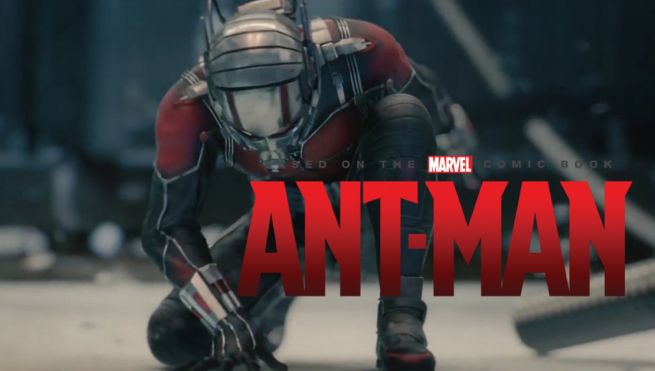Christophe Beck is an acclaimed composer who has worked on films from Bring It On and Frozen to RED and, out this week, Marvel’s Ant-Man.
Videos by ComicBook.com
His ties to the film run deep — he’s got longtime professional connections with both director Peyton Reed and the head of Marvel’s music department. Which made Beck an ideal candidate to step in when original Ant-Man director Edgar Wright left — and took his composer with him.
So…what was his process like? Beck joined ComicBook.com to discuss the film in time for its theatrical release this weekend.
You’re working on Peanuts, which is a high-profile project out soon, while actively promoting Ant-Man, out right now. Is it kind of a crazy time to be you?
It’s always crazy to be me. I am recording the score to Peanuts in about three weeks, but I have been working on and off on that one for about a year and as a result it’s not the usual, last-minute panic and chaos. We’re actually in pretty good shape.
I don’t know that much about the process, but I imagine that’s a little easier with animated films since they have to lock the animation at some point.
That’s true. And they do it scene-by-scene, so you can get a lot of scenes much earlier in the process than you would get on a live-action film.
How much of “you” comes through on a project like Ant-Man, versus how much you have to kind of write a score that meshes with the Marvel brand?
It’s not so much that it needs to meld with the sensibility of the other Marvel films — though it does, to some extent — but it’s that, like any film score that a composer does — it has to meld with the sensibilities of the people making the creative decisions.
At Marvel, there’s Kevin Feige, who’s basically the main creative force there. There’s a couple of other executives that were at most of the music meetings as well, and then there’s me and the director — and he and I are the ones that work the most together. I see him more often than the other folks.
I would say that besides Kevin letting me know that his taste runs toward the most traditional, symphonic superhero theme with a big main theme and brassy and bold, and that whatever we decide to do, to make sure that’s a big part of the score, there was no micro-managing, there was no time when Peyton and I felt like the studio were unnecessarily interfering or anything like that. They were pretty hands-off, I think, except for that basic instruction to not go too crazy and to not stray too far from the traditional symphonic approach or, as you put it, the way that Marvel movies sound as a whole.
I think that the way the franchise is put together — that it’s a loose collaboration of lots and lots of talented people — makes it a fascinating process.
Yeah. I can tell you that at first, Peyton and I had some pretty exciting but strange ideas about portraying the whole aspect of the story that had to do with insects with sort of glitchy, broken-sounding electronics that gave it a robot-like but skittery kind of a feeling.
We’re both into some of the same electronic music and he played me some songs from some recording artists that he felt had some sounds that were really appropriate for the film. We spent a few weeks exploring this and I came up with some material that was very exciting at the time and I listen back to it now and it’s still very exciting musically to hear that — but in retrospect I can see that it just wasn’t right for the film. When Kevin heard it, he thought it was musically interesting as well but it just didn’t feel right for the movie. He said something like “I don’t like it when the music makes me think my speakers are broken,” and that is kind of what the music was like; it was pretty out there.
Now that I’m done, it’s amazing to think of that, as even something we were considering.
That sounds to me like it would be the Junkie XL/Mad Max version of the score.
Well, you know, there might be some version of the Ant-Man movie that would be awesome with an experimental electronic score, but not for this one.
You’ve done a lot of films that were not only big hits, but projects where music was key to the film’s success. What really interests you going into something like Ant-Man?
In particular with Ant-Man, the opportunity to do, frankly, a Marvel movie — which, you know, they make great movies, they’re huge successes and they’re movies that I enjoy as a fan. And the palette for superhero movies is, for a composer, very juicy and appealing, especially for composers of my generation and it’s really the composers of my generation doing the Marvel movies now. We kind of grew up on Star Wars.
At a superhero panel we recently gave at Comic-Con, there were five of us there including [Batman V Superman‘s] Junkie [XL]. The question came, what was the thing that got us into film scoring, got us excited about film scoring, and four out of five of us said Star Wars. Junkie told a great story about making some kid cry in grade school. But I think that for a lot of the composers of my generation, we grew up on Star Wars and so the idea of doing a bold, orchestral, tuneful score is very exciting for most of us.
And, you know, in general what I look for, honestly, is nice people to work with. It doesn’t matter the genre. I know I’ve done a lot of comedies and sometimes I feel like I should do less comedies, I should do more of other types of things, but honestly if the film’s inspiring and the people are nice, then I’m there.
Did you come on with Peyton, or were you attached when he joined up?
When Peyton was brought on and they needed a new composer. I think for a couple of reasons — first that I’d worked with Peyton before. It’s been a while, but I scored his movie Bring It On; it was both of our first big feature films. So there was that, there was a relationship with Peyton, even though we hadn’t worked together in a long time.
And then there’s Dave Jordan, who’s the music supervisor for all the Marvel films, who I’ve known for a long time and have done a lot of movies with and who had been occasionally, when the time was appropriate, pushing me to be considered for some of these other films. So I’d made a lot of short lists in the last few years, but I’d never quite broken through. I guess the combination of it being a director that I’d worked with before and Dave Jordan continuing to support me and frankly that this was a little bit more of a comedy than some of the other Marvel films, that probably made me a bit of an easier sell becuase of the preponderance of the comedies I’ve got on my resume.
When I look at your resume, you did one of the most fun comic book movies in a long time, which is RED.
Yeah, I forget that’s a comic book movie, actually.
Ant-Man is kind of the opposite, isn’t it? Everything about Ant-Man just screams that it’s a comic book movie. Every element is kind of over the top. Is that a lot of fun to play with in the score?
Absolutely, because then the music can also be larger than life, and that goes back to the big palette that composers get to play with on these kinds of films.
I think what you’re referring to, also, is the absurdity of what we’re seeing a lot of the times. Especially soe of those fight scenes that take place when they’re shrunken, and the settings that they’re doing these battles in…the action sequences are very creative, the way they incorporate the tiny-size battles and the switching back and forth and the way that the environment is used in this case, it’s all very creative but it’s also all a little bit absurd.
Peyton didn’t shy away from that; there’s this great moment in the movie, that’s actually in most of the trailers, where they’re doing epic battle, but it happens to be while they’re shrunken and it happens to be on a kid’s train set. They’re going back and forth exchanging heavyweight blows, and the camera’s also in there so it seems to be larger than life. At one point there’s a massive collision with the train, and it gets derailed, and then we cut back to normal size and it’s just a little Thomas the Tank Engine that goes “tink” and it topples over.
It’s sort of reminding you that this whole thing is sort of ridiculous and I think that’s reflected in the music in a lot of places, too. I think that’s also a bit of a holdover of Edgar Wright’s sensibility a little bit to embrace the absurdity of it and to go for a little left of center musical choices in spots. So it’s fun to be able to do things a little bit differently when these scenes get particularly crazy and absurd.










